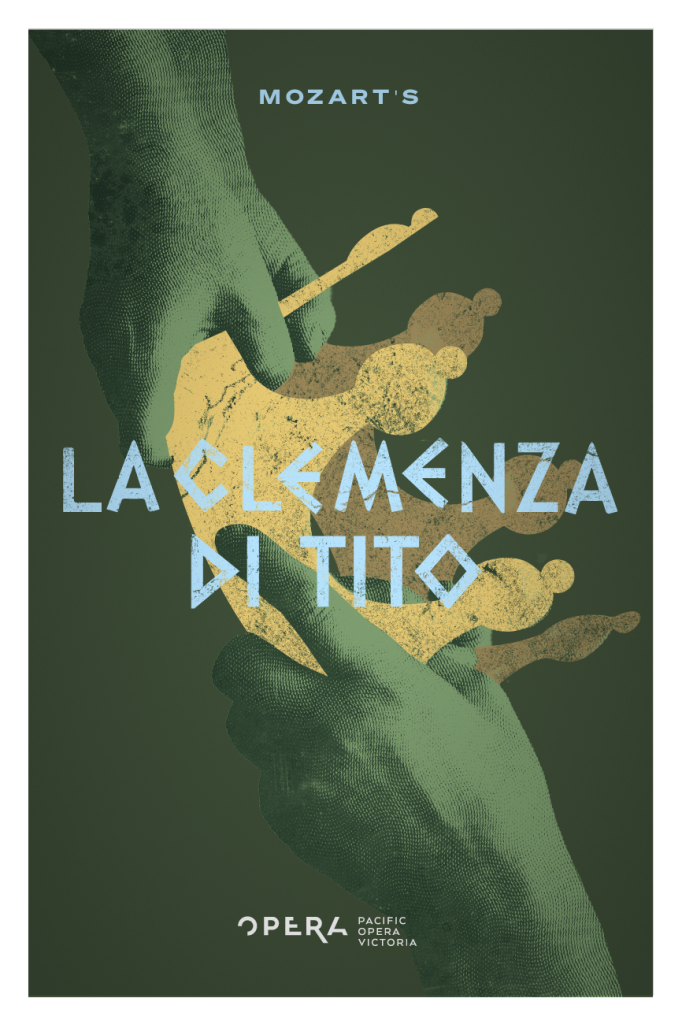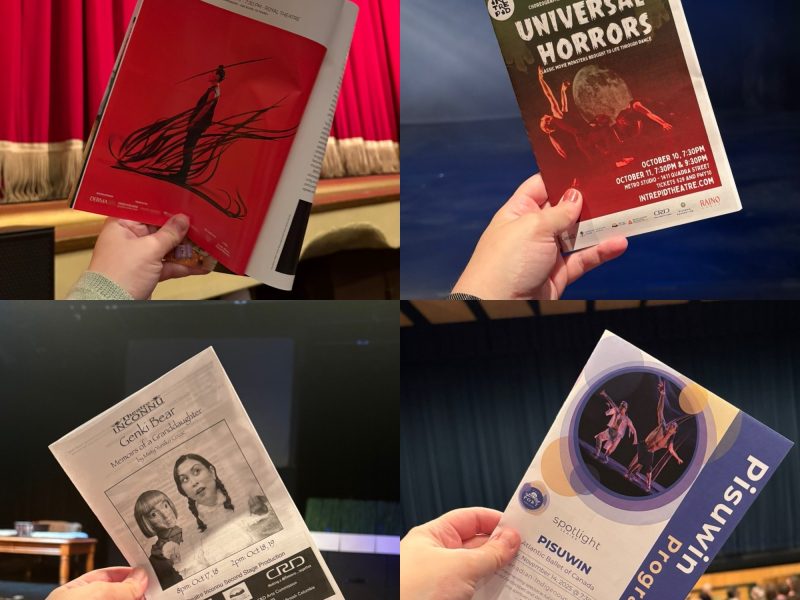It is a truth universally acknowledged that when watching a classic work, someone will inevitably reference timeless themes.
With apologies to Austen, this review of Pacific Opera Victoria’s production of La Clemenza Di Tito will indeed have to consider universal truths and timeless themes, but will also focus on this production itself. As an audience member, the themes of the production resonated deeply with me, so I’ll delve into those more at the end of this review.
The production was streamlined without feeling stark, with simple, striking elements used to great effect. Notably, the stage is filled with rings with emperor’s names inscribed between tick marks like on a clock or timeline. The looming, simple stage adds a level of weight to Tito’s reign, as it’s all a part of a larger timeline. The movement across the stage required steps ups and down, and initially, I assumed it would impede the flow, but the cast incorporated these movements and placed themselves on high or low ground to indicate location and status to great effect.
The costuming was spectacular – with stunning textures and shape combinations to give insight into the characters. It’s unclear when the characters are supposed to be, but I read that as a commentary on the timeless nature of the theme. Banners and pennants were used to set time and place in the story, and I was often delighted in how simple movement of fabric could be used so effectively to help tell the story. These details were incredibly clever and well considered.
This production made use of cross-gender casting, which worked extremely effectively for the role of Sesto. Taylor Raven’s powerhouse performance of failed loyalty and brokenhearted anguish was utterly riveting.
Somewhat less effective was Reilly Nelson’s Annio. While Nelson’s performance was truly excellent, especially when opposite Raven’s Sesto, when paired with Julia Dawson’s Servilia (played as a delightfully saccharine-sweet ingenue), the pair’s physical similarities made them look closer to siblings, which broke the illusion.
The entire cast, Victoria Symphony, and Pacific Opera Chorus were spectacular. For a relatively small community, Victoria has access to incredible artists and I am constantly delighted by what I get to experience in our arts scene, and these artists were no exception.
Overall, I felt it was an extremely effective production, embracing modernity where possible while still remaining true to the themes of the original text. There was some minor stage business that I didn’t understand, but one aspect that left me confused throughout was the use of the throne. Flown in early in Act 1, it is raised and lowered, sometimes addressed by characters on stage, and sometimes not. It was clearly included with intention, but its lurking presence felt like more of a distraction than an addition to this tale.
The themes of this opera are somewhat difficult to navigate with a modern lens of masculinity and leadership. Tito sings of love, and compassion, and (I don’t think this is a spoiler as the name refers to the clemency of Tito) forgiveness. There are universal themes (you’ll recall I foreshadowed this discussion earlier) in this opera that feel surprisingly fresh and lend themselves, in my opinion, to many modern discussions such as toxic masculinity.
There is something so beautiful about the concept of leadership that is built around humanity, and a love of service, concepts which are so aspirational, but feel like what we should all be striving for and holding our leaders to that higher standard. At a time where politics can be so vicious, an aspirational look at leadership which is demonstrably driven by love of it’s people, a commitment to truth, and a desire to lead with love and compassion first, is a breath of fresh air. Tito’s beautiful lament as he struggles with his desire to forgive:
If a hard heart is necessary to a ruler,
ye benevolent gods,
either take the empire from me
or give me another heart.If I cannot assure the loyalty
of my realms by love,
I care not for a loyalty
that is born of fear.
Tito is not just interested in loyalty – he understands keenly the fraught position of loyalty without criticism, and when Servilia tells him the truth about her situation, he exclaims joyfully:
I thank you, O gods in heaven, that one has been found
who will dare to speak an unwelcome truth.
What a keen insight to be offered: that while loyalty has a place, a sycophantic desire to appease a leader will corrupt the truth. This scene between Tito and Servilia was so pivotal to me coming to my understanding of Tito, and to me, helped establish a touching and nuanced character.
Tito’s benevolence can be discussed at length, and to what extent we can accept him for forgiving so much is an interesting discussion to be had. In this production, Vitellia’s method of convincing Sesto leaned quite heavily into a lust filled, steamy scene. I couldn’t help but imagine what message boards of toxic people would say about that, as if a sexual betrayal was somehow worse than what Sesto actually attempted.
But even without the complications of a sexual tryst, for Tito to forgive Sesto, his dearest friend, after Sesto had fallen so in love with Tito’s betrothed that Sesto was ultimately convinced to betray Tito, it’s a level of villainy that is hard to come to terms with, even though Sesto’s lamentations are convincing.
But perhaps that’s the discussion we were always meant to have, what can we forgive? How do we navigate deep betrayals when we have offered kindness and compassion? And how many times are we expected to offer forgiveness?
Tito expounds his life philosophy on forgiveness very clearly:
And if the world wants to accuse me
of some failing,
let it accuse me of mercy.
In our modern world of swirling fragile masculine rage, Tito’s leadership is utterly in the contrast, built instead on love and mercy. He doesn’t hide from his heartbreak when his dear friend betrays him, but embraces the pain and tries to forge through to understand.
This, to me is the effectiveness of the ending. Somewhat unclear, but “happy” in that Sesto is alive. Ultimately there is no double wedding, it is not really clear if Tito will ever be able to let Sesto or Vitellia into his heart again. It’s as happy an ending as we’ll ever get.
What happens next is for the audience to ponder, but throughout, Tito reaffirms his belief in the value of love and forgiveness, but what that forgiveness looks like is impossible to know.
Finally, there’s such a beautiful aspect of male friendship throughout this piece, I wish we could see more examples in media of dear male friends embracing and proclaiming their joy in being friends. While there are several examples throughout the opera, these lovely lines in particular brought joy to my heart:
Ah, let me embrace you dearly,
my faithful friend,
and may heaven ever keep
your friendship constant for me.
Love, truth, benevolence, friendship. Now, those are some universal themes I can get behind.
Disclaimer: I received free tickets to the show as a result of other volunteer work I do. No review was expected or requested.


